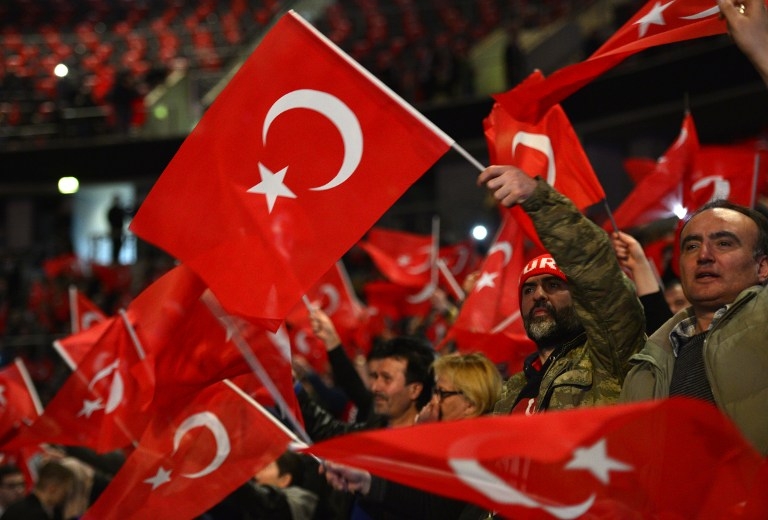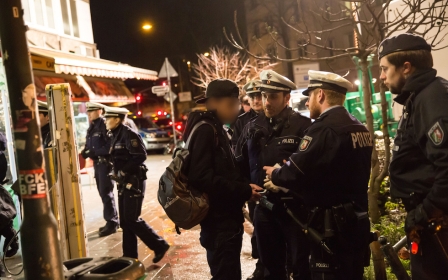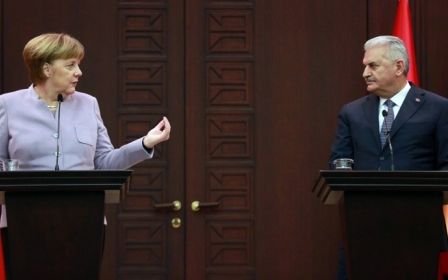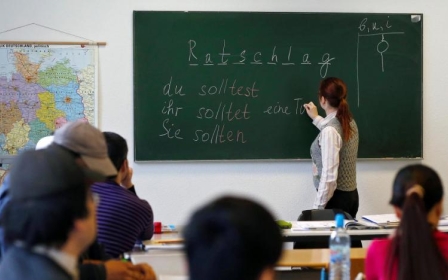Turkey accuses Germany of working against Erdogan

Turkey told Germany on Friday that it must "learn how to behave" if it wants to maintain relations, amid a week of continued tension between Ankara and Berlin.
On Thursday German local authorities stopped Turkish ministers speaking at meetings of supporters of Turkish President Recep Tayyip Erdogan, ahead of next month’s Turkish constitutional vote.
Turkish foreign minister, Mevlut Cavusoglu, said on Friday: "They don't want Turkey to campaign here, they are working for a 'No'. They want to get in the way of a strong Turkey."
'They don't want Turkey to campaign here, they are working for a 'No'. They want to get in the way of a strong Turkey'
- Mevlut Cavusoglu, Turkish foreign minister
Talking to reporters in Ankara, he added that "if necessary we will give a response in every way" - but did not elaborate. He said: "The obstruction of meetings in Germany is a sign of how much Germany and the West are displaying double standards."
The western town of Gaggenau withdrew permission on Thursday for a Union of European Turkish Democrats (UETD) rally, where Turkish minister Bekir Bozdag had been due to speak, citing a lack of space.
On Friday town officials said that they had recieved a bomb threat. Investigators searched the city hall, which had been evacuated, said mayor Michael Pfeiffer, who added the process could take several hours.
"We received a bomb threat by phone at around 7:30am (0630 GMT)," Dieter Spannagel, a local official from Gaggenau, told AFP. "The caller cited the cancellation of the event with the Turkish justice minister as a reason."
The latest spat adds to tensions between Nato allies Turkey and Germany since the failed coup bid to oust Erdogan last July.
Relations were strained further this week following Ankara's provisional detention of Deniz Yucel, a correspondent for the prominent German newspaper Die Welt, on terrorism-related charges.
Germany said on Thursday that the arrest had caused grave damage to ties between Ankara and Berlin, while Chancellor Angela Merkel as described it as "bitter and disappointing".
Turkish politicians in Germany
Erdogan's government is keen to harness the votes of Turks living abroad for the 16 April referendum, which would discard the post of prime minister for the first time in Turkey's history.
Germany is home to about three million people of Turkish origin, the biggest population of Turks outside of Turkey, the legacy of a massive "guest worker" programme in the 1960s-70s.
But politicians including Prime Minister Binali Yildirim have sparked controversy over their visits to Germany to hold political rallies.
Turkey's ruling AKP is campaigning for a Yes vote in next month's referendum, which it says will bring stability. Critics say the new presidential system would cement one-man rule in the country.
Turkey summoned Germany's ambassador in Ankara on Thursday to protest against the cancellation.
"Our discomfort and our reaction to these developments have been communicated in person to the German ambassador who was summoned this evening to the (foreign) ministry," a senior Turkish official said on condition of anonymity.
For his part, Bozdag - who was on an official visit to Strasbourg - said that the meeting would not take place and that he would return to Turkey, in remarks carried by TV station NTV.
"It is unacceptable that German authorities, who constantly lecture us about human rights, democracy, rule of law, free speech... do not tolerate a meeting organised by the Turkish community," he said.
Cologne also cancels rally
Separately, Cologne city authorities said they would no longer allow the UETD to use a hall on Sunday where Nihat Zeybekci, Turkish economy minister, was expected to make a rally speech.
"The event can and will not happen there," a spokeswoman for Cologne city authorities told AFP, citing difficulties in guaranteeing security at such short notice.
It was unclear if Zeybekci would be able to find an alternative site.
In a series of tweets, Turkey's EU affairs minister Omer Celik slammed the German authorities' move, saying it would be a "success for racists".
"By behaving so, they (German authorities) are harming the bridges between the democracies and building ideological Berlin walls that cut off people from each other," Celik wrote.
New MEE newsletter: Jerusalem Dispatch
Sign up to get the latest insights and analysis on Israel-Palestine, alongside Turkey Unpacked and other MEE newsletters
Middle East Eye delivers independent and unrivalled coverage and analysis of the Middle East, North Africa and beyond. To learn more about republishing this content and the associated fees, please fill out this form. More about MEE can be found here.





